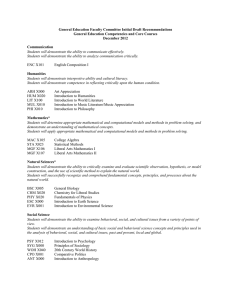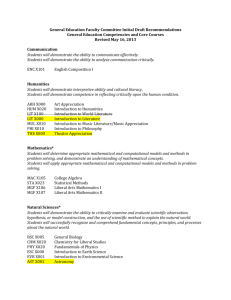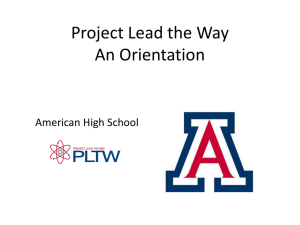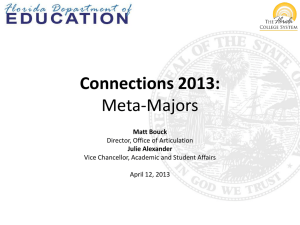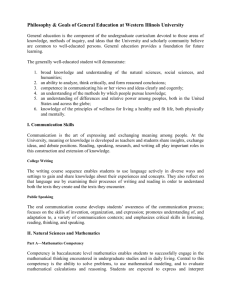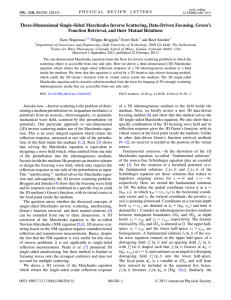Chair Report - Faculty Senate
advertisement
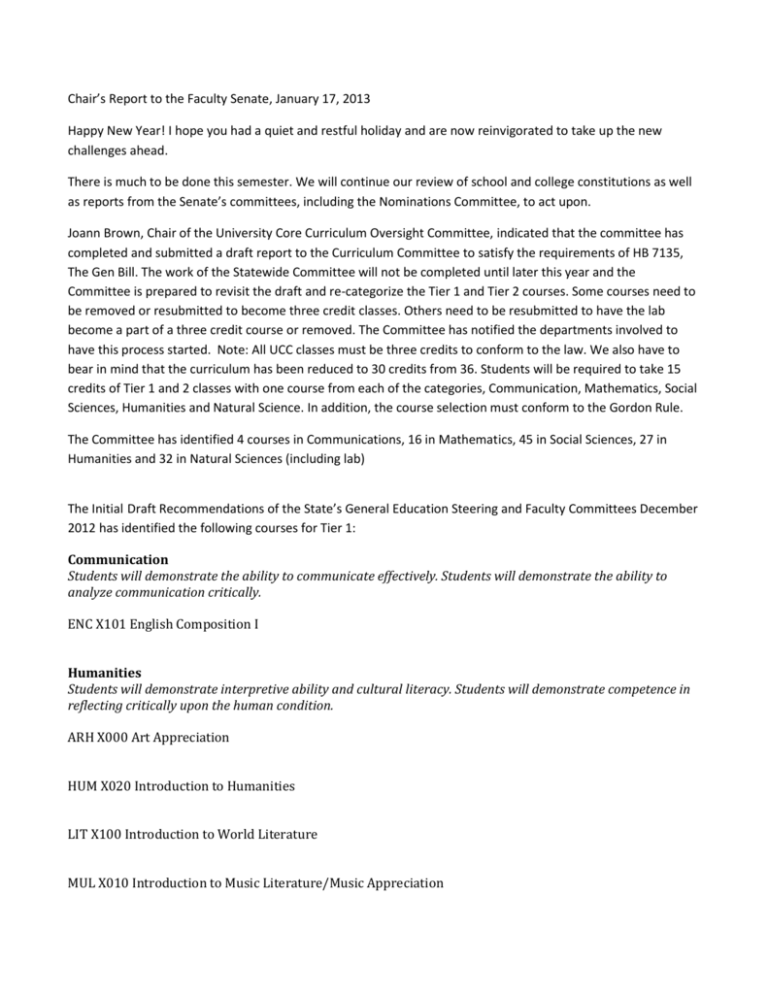
Chair’s Report to the Faculty Senate, January 17, 2013 Happy New Year! I hope you had a quiet and restful holiday and are now reinvigorated to take up the new challenges ahead. There is much to be done this semester. We will continue our review of school and college constitutions as well as reports from the Senate’s committees, including the Nominations Committee, to act upon. Joann Brown, Chair of the University Core Curriculum Oversight Committee, indicated that the committee has completed and submitted a draft report to the Curriculum Committee to satisfy the requirements of HB 7135, The Gen Bill. The work of the Statewide Committee will not be completed until later this year and the Committee is prepared to revisit the draft and re-categorize the Tier 1 and Tier 2 courses. Some courses need to be removed or resubmitted to become three credit classes. Others need to be resubmitted to have the lab become a part of a three credit course or removed. The Committee has notified the departments involved to have this process started. Note: All UCC classes must be three credits to conform to the law. We also have to bear in mind that the curriculum has been reduced to 30 credits from 36. Students will be required to take 15 credits of Tier 1 and 2 classes with one course from each of the categories, Communication, Mathematics, Social Sciences, Humanities and Natural Science. In addition, the course selection must conform to the Gordon Rule. The Committee has identified 4 courses in Communications, 16 in Mathematics, 45 in Social Sciences, 27 in Humanities and 32 in Natural Sciences (including lab) The Initial Draft Recommendations of the State’s General Education Steering and Faculty Committees December 2012 has identified the following courses for Tier 1: Communication Students will demonstrate the ability to communicate effectively. Students will demonstrate the ability to analyze communication critically. ENC X101 English Composition I Humanities Students will demonstrate interpretive ability and cultural literacy. Students will demonstrate competence in reflecting critically upon the human condition. ARH X000 Art Appreciation HUM X020 Introduction to Humanities LIT X100 Introduction to World Literature MUL X010 Introduction to Music Literature/Music Appreciation PHI X010 Introduction to Philosophy Mathematics* Students will determine appropriate mathematical and computational models and methods in problem solving, and demonstrate an understanding of mathematical concepts. Students will apply appropriate mathematical and computational models and methods in problem solving. MAC X105 College Algebra STA X023 Statistical Methods MGF X106 Liberal Arts Mathematics I MGF X107 Liberal Arts Mathematics II Natural Sciences* Students will demonstrate the ability to critically examine and evaluate scientific observation, hypothesis, or model construction, and the use of scientific method to explain the natural world. Students will successfully recognize and comprehend fundamental concepts, principles, and processes about the natural world. BSC X005 General Biology CHM X020 Chemistry for Liberal Studies PHY X020 Fundamentals of Physics ESC X000 Introduction to Earth Science EVR X001 Introduction to Environmental Science Social Science Students will demonstrate the ability to examine behavioral, social, and cultural issues from a variety of points of view. Students will demonstrate an understanding of basic social and behavioral science concepts and principles used in the analysis of behavioral, social, and cultural issues, past and present, local and global. PSY X012 Introduction to Psychology SYG X000 Principles of Sociology WOH X040 20th Century World History CPO X001 Comparative Politics ANT X000 Introduction to Anthropology This initial institution review period will conclude by February 2013, at which time the Steering Committee will conduct a review and revision of the recommendations. An institution faculty review period is scheduled from March to August 2013, with a public comment period beginning in June 2013. The Parthenon Group has been engaged in a project with the Florida Board of Governors to develop the fact-base for Florida post-secondary online education and identify potential online strategies to expand the number of post-secondary graduates through the use of online education. A presentation of their finding was made to the BOG Strategic Planning Committee at a workshop December 17, 2012, at Florida Atlantic Davie Campus. The summary presentation and detailed fact-base presentation include additional information on the options they developed through an iterative process with higher education stakeholders across the state. The final report and presentation will be made to that Committee on January 16-17, 2013 with a follow up to the full Board for consideration. These strategies include: 1) Institution by Institution: Institutions continue to develop online offerings on their own, driving innovation in a way that fits each institution’s mission. The state will clarify objectives of expanded online learning models, but potential collaboration among institutions remains at their own discretion. 2) Institutional Collaboration: System-wide online degree program offerings are developed under the direction of a coordinating body (e.g., FLVC, BoG, FL DOE). Centralized marketing, onboarding, support services, and data analytics are each either managed by the central body or one of the participating institutions. Program-level RFPs are issued to institutions for program development. Online degree programs developed collaboratively under the direction of this coordinating body would be marketed to students across the state. 3) Lead Institution: One (or a few) institution is selected by RFP process to drive the development of new online programs in target degree levels and disciplines. The lead institution would be selected on the basis of a performance grant process that allows applicants to emphasize existing best practices and organizational strengths that can contribute to effective state-wide online degree programs. This institution, on its own or with other institutions, would need to ensure program access to a diverse student body. 4) New Online Institution: An online institution is launched with a mandate to drive the development of new online programs in target degree levels and disciplines. The primary focus of these strategies has been on the development of online-only degree programs, and the marketing, onboarding, support services, and data analytics needed to make them successful. There appears to be no active support for solution four and this lack of support may influence what eventually is decided. There will have to be a conversation with the Administration to determine how this would be included with the plans for FIU Global. The fourth meeting of the Campus Master Plan Sub Committee was held on January 8 2013 with a presentation by the Perkins and Will Consultants. In addition to the proposed expansion of the MMC Campus, more details were provided for the projected expansion of BBC and the Engineering complexes. For BBC, there are discussions of a meeting facility for Carnival Cruise Line which will provide 20% of its space for FIU programs, expansion of the School of Journalism additional housing and the building of a magnet school. The proposed magnet school was discussed with the Provost at the Steering Committee meeting and he confirmed that this was under discussion. If these plans were adopted, it would require providing a second access road to the campus. The discussion on the Engineering complex would require more evaluation as it is at the northeast corner of a very busy intersection with shopping malls at the other four corners. The reconstituted Ad Hoc Committee to review the FAAS system will convene this month so we may be able to present the Provost with a document for use this academic year. The provost has agreed to lend his support to this effort and a member of the administrative staff will be added to the Committee. You may have notice that there were some improvements in the parking situation for this semester. The Administration has made an effort to resolve the issue. In the fall there were 3922 students eligible for graduation, 2789 undergraduates and 1133 graduates. The participation of the Faculty was also impressive. Thanks. The Faculty Senate Honorary Degrees and Awards Committee invites you to submit names of worthy men and women in your units who have established high records of achievement in the following six categories(number of awards): Advising and Mentorship (3); Engagement (1); Librarianship (1); Research and Creative Activities (6); Service (1); and Teaching (6). Each award carries a $5,000 stipend. The awards will be presented at the annual Faculty Convocation held during the Fall Semester, 2013. Please note the important deadlines: For nominations: Friday, February 1, 2013 at 5:00PM. For submission of completed files: Friday, February 15, 2013 at 5:00PM. Regards, C Delano Gray, Chairman.
